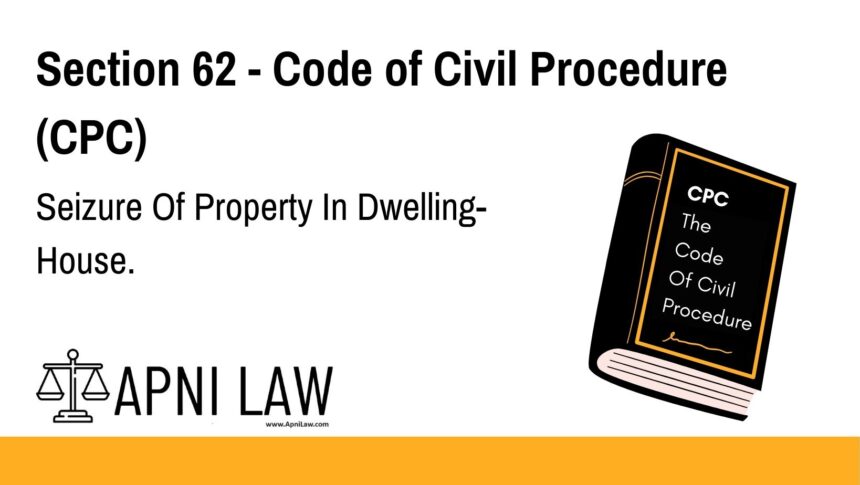Code
CPC(I) No person executing any process under this Code
directing or authorizing seizure of movable property shall enter any dwelling-house after sunset and
before sunrise.(2) No outer door of a dwelling-house shall be broken open unless such dwelling-house is in the
occupancy of the judgment-debtor and he refuses or in any way prevents access thereto, but when the
person executing any such process has duly gained access to any dwelling-house, he may break open the
door of any room in which he has reason to believe any such property to be.(3) Where a room in a dwelling-house is in the actual occupancy of a woman who, according to the
customs of the country, does not appear in public, the person executing the process shall give notice to such
woman that she is at liberty to withdraw; and, after allowing reasonable time for her to withdraw and giving
her reasonable facility for withdrawing, he may enter such room for the purpose of seizing the property, using
at the same time every precaution, consistent with these provisions, to prevent its clandestine removal.
Perfect — this is Section 62 CPC, which deals with the manner of seizure of movable property inside a dwelling house. Here’s the article in the same structured SEO-friendly format:
Section 62 CPC – Seizure of Movable Property in Dwelling-Houses
Code: Section 62 of the Civil Procedure Code, 1908
62. Seizure of movable property in dwelling-houses.
(1) No person executing any process under this Code directing or authorizing seizure of movable property shall enter any dwelling-house after sunset and before sunrise.
(2) No outer door of a dwelling-house shall be broken open unless such dwelling-house is in the occupancy of the judgment-debtor and he refuses or in any way prevents access thereto; but when the person executing any such process has duly gained access to any dwelling-house, he may break open the door of any room in which he has reason to believe any such property to be.
(3) Where a room in a dwelling-house is in the actual occupancy of a woman who, according to the customs of the country, does not appear in public, the person executing the process shall give notice to such woman that she is at liberty to withdraw; and, after allowing reasonable time for her to withdraw and giving her reasonable facility for withdrawing, he may enter such room for the purpose of seizing the property, using at the same time every precaution, consistent with these provisions, to prevent its clandestine removal.
Explanation of Section 62 CPC
This section provides procedural safeguards when officers seize movable property from a dwelling-house during execution of a decree. It balances the rights of the decree-holder with the privacy and dignity of the judgment-debtor’s household.
Key Points:
- Time Restriction:
- Officers cannot enter a house after sunset or before sunrise.
- Prevents harassment at odd hours.
- Breaking Doors:
- An outer door cannot be broken open unless:
- The house belongs to the judgment-debtor, and
- He refuses or prevents access.
- Once inside, officers may break open inner doors/rooms where they reasonably believe property is kept.
- An outer door cannot be broken open unless:
- Special Protection for Women:
- If a room is occupied by a woman who, per local custom, does not appear in public:
- Prior notice must be given.
- Reasonable time and facility must be provided for withdrawal.
- Officers can only enter after these safeguards.
- If a room is occupied by a woman who, per local custom, does not appear in public:
- Objective:
- To prevent misuse of execution powers.
- To uphold privacy, dignity, and cultural customs.
Illustration
- Example 1: A bailiff comes to attach furniture in a debtor’s house at midnight. This is illegal under Section 62 as entry after sunset is prohibited.
- Example 2: If the judgment-debtor locks the house and refuses access, the outer door may be broken open — but only if it is his house.
- Example 3: If a woman who follows purdah is in a room, the officer must first give her time to withdraw before entering to seize property.
Common Questions and Answers
1. Can officers enter a house at night to seize property?
No. Entry is allowed only between sunrise and sunset.
2. Can outer doors of a house be broken?
Only if the house is occupied by the judgment-debtor and he refuses to give access.
3. What if property is hidden inside a locked room?
Once lawfully inside the house, officers may break open inner rooms if they have reason to believe property is stored there.
4. What safeguards are there for women?
Where women, due to custom, do not appear in public, officers must give notice and allow withdrawal before entering the room.
5. Why does the law impose these restrictions?
To ensure respect for household privacy and prevent abuse of power during execution.
Conclusion
Section 62 CPC places strong procedural limits on how movable property can be seized from a house. It prohibits night raids, protects women’s dignity, and ensures that force is used only when strictly necessary. This balances the enforcement of decrees with the protection of fundamental rights and social customs.
For more insights on execution law and debtor protections, visit ApniLaw.








